Portugal might just be one of the greatest countries in Europe.
In fact, it took just two days for me to decide to uproot my nomadic life and move there. I’m not kidding: I rocked up in Lisbon for the first time back in 2016, fell deeply in love with the city, then began looking for an apartment two days later. I found my dream home after a month of searching, signed a lease, and the rest was history. I love this country.
To me, Portugal has it all. It’s home to a massively underrated food scene, welcoming locals, the most beautiful buildings, and fantastic weather. For a long time, it was overlooked in favour of its more popular neighbours like Italy, Spain, and France, but that’s not the case any more.
While those extra tourists have caused some prices to increase, especially since the pandemic, Portugal is still one of the more affordable countries in Western Europe — and especially when you travel outside of Lisbon and Porto. (Which you should, by the way, because Portugal has so much to offer outside of its two most famous cities.)
I’ve been recording every single dollar, peso, and baht that I’ve spent on my travels since 2011 (I now have over 65 budget breakdowns on my site!), aiming to give you an accurate picture of how much you can expect to spend in every country around the world. Today, it’s Portugal’s turn and I’m so excited to start sharing.
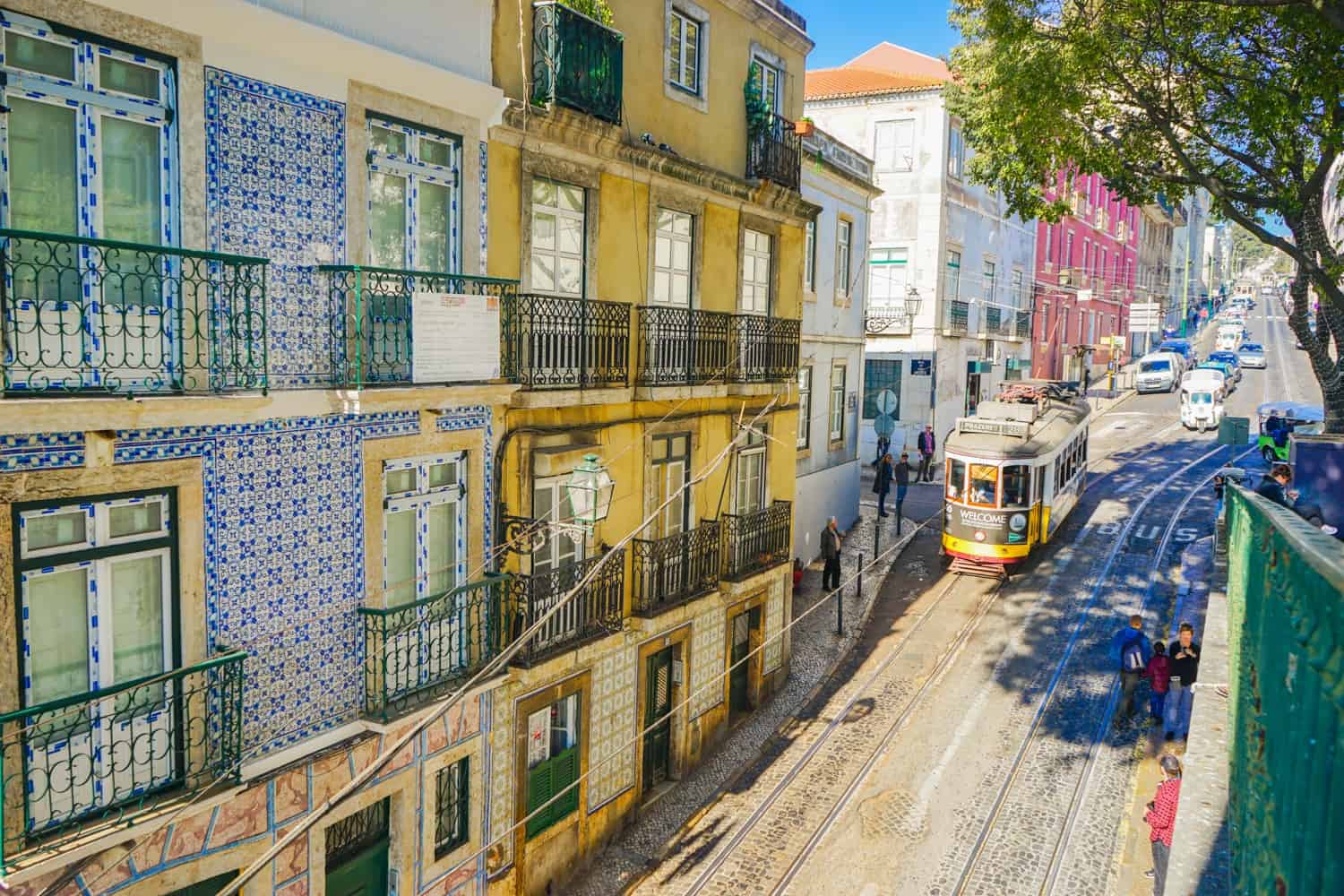
The Cost of Accommodation in Portugal
As always with travel, it’s possible to cut your accommodation costs down to zero if you have the time and patience to seek out an offer.
How to Save Money on Accommodation in Portugal
Housesitting exists in Portugal, and is a fantastic option if you’re looking to save money.
This is where you’ll take care of somebody’s house for free while they’re away, and often look after their pets, too. It’s best for long-term travellers or retirees, as you can’t pick and choose dates (they’ll obviously be based on the owner’s vacation dates) so you’ll need to have a lot of flexibility as to where you go and at what time of year.
If you do have that freedom, though, it’s a wonderful way to cut down your travel expenses, soak up some home comforts, and live like a local for a while. Some of my friends have even landed housesitting gigs for castles and chateaus in Europe! Trusted Housesitters is the best site for getting started with housesitting.
I’m suspecting, though, that for most of you, you’re not interested in the free accommodation and just want somewhere clean, safe, and affordable to rest your head each night. If that’s the case, there are several options available for you.
Types of Accommodation in Portugal
The first of these are hostels. In Portugal, you’ll come across hostels all over the country, finding them on tiny islands, in large cities, and even in the national parks. They’re one of your best options for saving money.
Hostels in Portugal are on a par with the rest of major cities in Western Europe, and you can expect to spend around €25 a night for a dorm bed for a well-reviewed hostel in Lisbon, with the price increasing to slightly about €35 a night for the absolute best of the best.
When it comes to private rooms in hostels, you can expect to spend around €50 a night for a clean, basic room in a good location, so if you’re travelling with friends or with your partner, you may find it cheaper to grab some privacy over settling for two beds in a dorm room. €100 a night will get you an exceptionally well-reviewed private room in a hostel.
If you’re an older traveller and put off by the thought of nights spent in hostels, you shouldn’t be! Private rooms are usually very quiet and clean, and most hostels are modern, safe, and centrally located. They tend to have a little more personality than generic hotels, and the staff are fantastic at offering kickass travel advice. As long as you check the reviews of any hostel before booking it to make sure nobody refers to it as a party hostel, you’re all good to make a booking there.
I use HostelWorld to find the cheapest hostels, as they tend to have the greatest number of listings at the lowest prices.
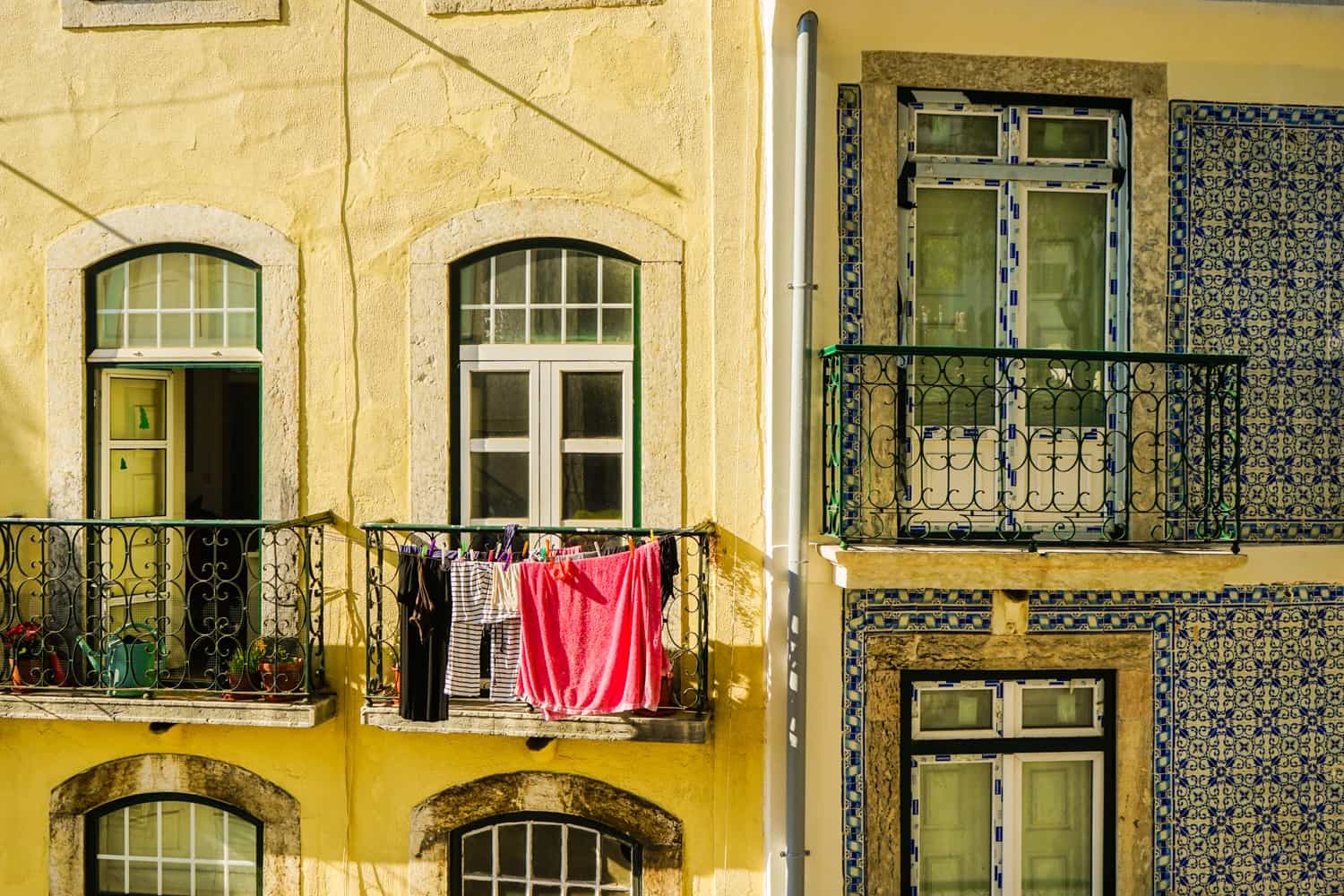
And, of course, there are always hotels, which again will usually start at around €50-€100 a night for a decent, clean, mid-range property in a central location. I always use Booking.com, as they have the most accommodation options for the cheapest prices — but more on that below.
There’s going to be no sugarcoating here: Portugal — and Lisbon, in particular — has been screwed over by the arrival of Airbnb.
Essentially: landlords in Lisbon came to realise that if they listed their properties on Airbnb, they could make more money from tourists in two months than they could from renting to locals year-round. And so began the slow transformation of Lisbon, in which locals — my friends — were forced out of their homes to make way for Airbnbs, and prices grew and grew and grew and grew.
When the average salary for locals in Lisbon is just €1,000 a month and the average Airbnb apartments are listed at well over €2,000 a month, you find yourself with a city that’s packed full of short-stay tourists with many locals pushed out into the very outer suburbs.
It’s for this reason that I want to strongly recommend that you don’t use Airbnb while staying in Lisbon and Porto.
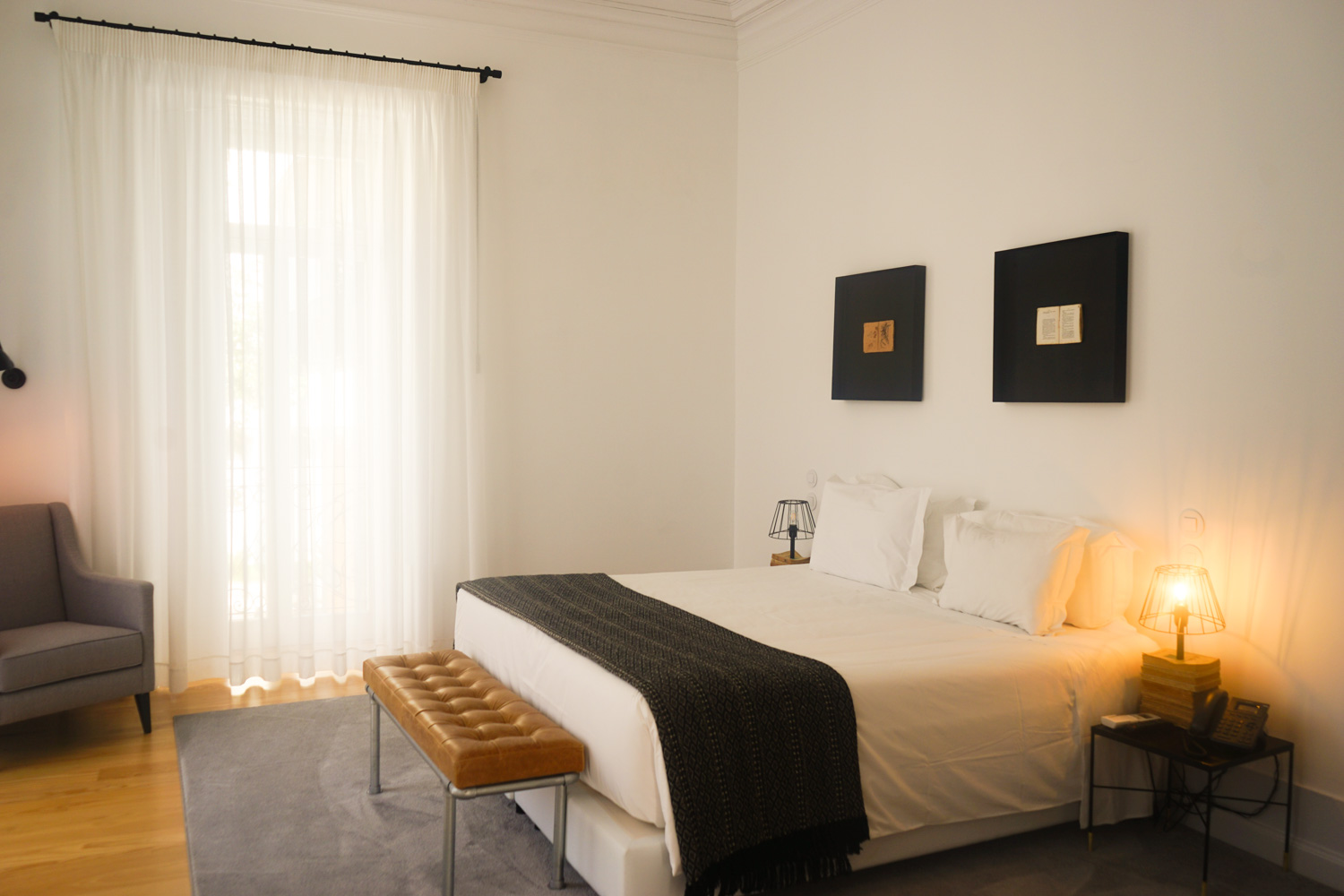
Here’s where I do recommend you stay:
Lisbon: When friends ask me where to stay in Lisbon, I always tell them my number one rule: you must stay within a 20-minute walk of the city’s Time Out Market. If you’re inside that radius, you’ll be within walking distance of the majority of the tourist attractions. Outside of that? It’s going to be a pain in the ass.
My favourite neighbourhood in Lisbon is Principe Real, which is where I used to live. It’s easily the best area in the city — you’ve got tons of great restaurants and bars, peaceful parks to wander around, gorgeous buildings, great views over the city, and hardly any crowds because there’s close to no tourist attractions in this part of town. (But don’t worry — everything is still walkable from here.)
In terms of hotels in Principe Real, your best option is easily Toctoctoc Lisboa, a lovely boutique hotel that comes in at €225 a night for a deluxe room with garden views. This is where I always tell all of my friends and family to stay. Because is this the most gorgeous hotel ever? Yup! Seriously, the entire garden area is so beautiful. It’s in a great location but still super-quiet, has the most delicious breakfast, full of breads from the local bakery, and such tastefully-decorated rooms. It’s rated 9.5 on Booking.
Porto: We stayed in Republica 157 Guest House (€95 a night) during our most recent stay in Porto, and it was so lovely! It’s right in the heart of Porto but still super-quiet at night, with the sweetest owners who left treats in our room while we were out exploring and did all they could to ensure we had a great time in the city.
Coimbra: Sapientia Boutique Hotel (€188 a night): We stayed in this gorgeous hotel for my partner’s birthday and it was truly such a wonderful treat. It’s a literary-themed hotel, but not in a tacky way, with rooms named after famous authors, bedside lamps built from second-hand books, and minimalist decorations featuring quotes from famous works. On top of that, the staff were the best, putting together a delicious breakfast, greeting us with free glasses of port and pasteis de nata, and offering up free wine on the rooftop terrace each evening. This was definitely a splurge for me, but one of those times when it felt more than worth it.
Evora: If you love your food, I’m going to absolutely insist that you plan to spend at least a few days in Evora while you’re in Portugal. It’s easily accessible from Lisbon and the food scene is absolutely phenomenal. My partner and I splurged on this trip, too, and decided to stay in Pousada Convento de Evora at a price of €216 a night. But what an incredible property: it’s an old converted monastery, located directly opposite a Roman temple, which makes for a particularly spectacular view each morning. With a swimming pool that’s perfect for cooling off in, lovely staff, and a large breakfast, this hotel made for the perfect romantic getaway.
Average Costs for Accommodation in Portugal
If you’re on a tight budget, you’ll be looking at around €15-25 a night for a dorm room in a hostel, or €50-100 a night for a private room.
If you’re on a mid-range budget, expect to spend around €100-150 a night for a well-reviewed, modern, centrally-located hotel.
If you’re willing to go all out and splurge, you’ll be looking at around €250 a night for one of the best hotels in town.
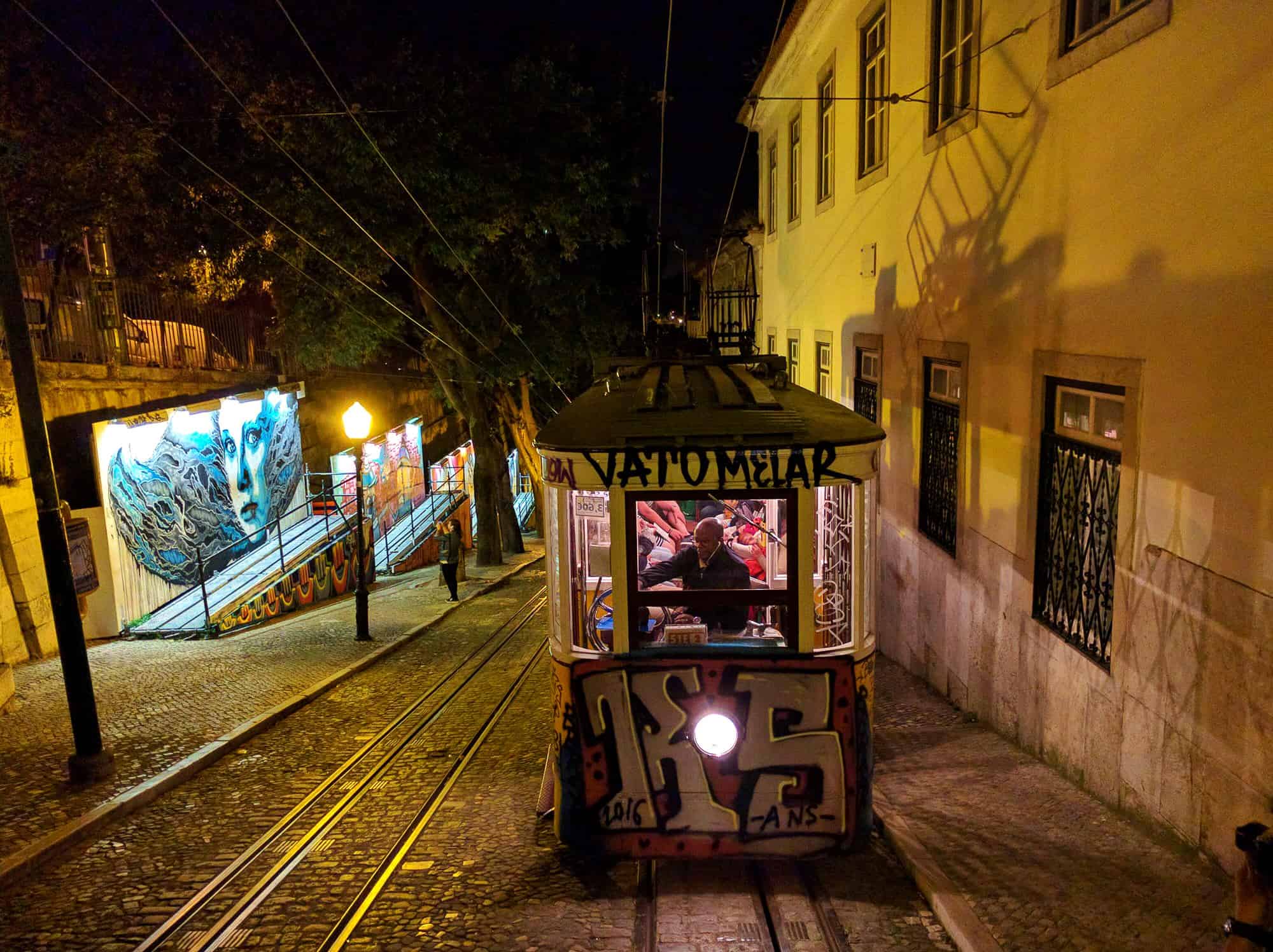
The Cost of Transportation in Portugal
When it comes to public transportation in Portugal, there’s plenty of ways to get around. In Lisbon and Porto, you’ll most likely find yourself not needing to use it at all, as most of the attractions are within walking distance of each other.
Even while living in Lisbon, I took public transport about once every six months — and usually that’s hopping on a tram to avoid trekking up a particularly steep hill. That’s the one downside of getting around Lisbon by foot, by the way: it feels like every single street takes you up a steep incline and sometimes you just want to walk for five minutes without feeling like it’s a full-on workout.
Oh, and a word of warning: many of the streets in Lisbon are cobblestoned, so when it rains, it gets real slippery. A survey of elderly Lisbonites had them sharing their greatest fear in life is falling over on the city’s pavements. There’s a whole lot of people with fake hips in this city! Flip-flops are a definite no-no.
I feel like I’m not really selling the whole you-should-walk-everywhere-in-Lisbon-thing to you?
Here are the most common forms of transportation in Portugal:
Metro and Tram (Lisbon and Porto) — Besides walking, one of my favorite ways to experience a city is by understanding their local metro system. Lisbon and Porto (plus Almada on the other side of the river to Lisbon) are the only cities that have one in the country, so if you don’t like to walk, you’ll probably make use of both during your explorations.
It’s usually easiest and cheaper to get a day pass if you plan on spending a day sightseeing in these cities. In Lisbon, a day pass on the public transportation system costs €6.80, or €10.80 if you want to go further out to places like Sintra. In Porto, it’s €7.50.
Of course, if you’ve seen any classic photos of Portugal, you’ll have probably noticed the famous, historic trams. These are traditional electric cars from a bygone era. Nowadays, they’re not so much a main method of getting around as they are an experience. I would recommend riding one early in the morning to avoid the midday tourist crowds. Number 28 is the iconic route: just be sure to watch your bags, as pickpockets are active on the trams. You can use your metro day pass or buy a one-way fare onboard for €3.10.
Train — You’ll be happy to hear that most cities and towns are connected by Portugal’s train system: Comboios de Portugal. You’ll be even happier to know that train tickets in Portugal are fairly inexpensive. I’ve taken the train all over Portugal, from Lisbon to places like Coimbra, Evora, and Porto, and booking tickets is always a breeze. There are four different types of trains within Portugal’s network:
- Regional Trains (R) (Regionais): shorter distances, make lots of stops, and tend to be slower
- Intercity Trains (IC) (Intercidades): for between major cities and towns; they make fewer stops, and tend to be faster
- Alfa Pendular (AP): a high-speed train that goes the fastest, connects all the major cities, and runs the length of the entire country from north to south
- Urbanos (U): subway systems within individual cities
The cost of a train depends on the date and time you’re traveling, and the type of train. To give you an idea of prices, here are some standard one-way train fares for the most popular routes. There are often also promo fares that give big discounts when booked in advance: I’ve grabbed one-way fares from Lisbon to Porto for as little as €10.
- Lisbon to Porto
- Intercity: €26.85
- Alfa Pendular: €33.90
- Lisbon to Faro
- Intercity: €25
- Alfa Pendular: €26.45
- Porto to Coimbra
- Intercity: €14.60
- Alfa Pendular: €18.70
Bus: Bus services in Portugal include both regional and local buses, as well international coaches — I took a coach from Porto to Madrid several years ago, and a local bus between Porto and Braga for a day trip, and both were comfortable, easy rides. There are frequent coach services between all Portuguese cities and a network of the national and several private bus companies covering most of Portugal.
You’ll usually have the option of either an express or slower bus service, and prices will vary according to distance, time, and company. Generally, fares will start at €5 but shouldn’t cost more than €20 for a journey.
RedeExpressos is the largest bus company in the country, followed by Rodonorte (which covers the north) and Eva Transportes (which covers the south).
Plane: Portugal is a small country, so I don’t recommend flying if you’re going to be travelling around the mainland — by the time you get to the airport and wait around for your flight and go through all of that hassle, you’d probably already be at your next destination if you’d gone by train. It takes just four hours to get from Lisbon to Porto on the train, for example.
If you’re going to be heading to Madeira or the Azores, flying is the only option. I use Skyscanner for finding the cheapest flights, and you can expect to pay around €60 return from Lisbon to either Funchal (Madeira) or Ponta Delgada (the Azores).

The Cost of Food in Portugal
One of my greatest joys to come from living in Portugal was the food. Portuguese food is such an underrated cuisine and it’s one of my favourites in all of Europe. It’s so much more than just salted cod and sardines.
Of course, there are pasteis de nata — Portuguese egg tarts — if you know anything about Portuguese cuisines, it’s most likely that these little treats are absolutely delicious. Fun fact: if you go to an El Corte Ingles department store in Portugal and tell the information desk that you’re a tourist, they’ll gift you with a free tart and glass of port!
If you want to sample the best of the best, though, head to either Pastéis de Belém or Manteigaria — they’re popular for a reason. Expect to pay between €1 and €1.50 for one pretty much anywhere in town.
If you want to eat local, head to a less-popular neighbourhoods and look for the signs advertising a prato do dia — you’ll usually pay around €10 for a three-course meal with a glass of wine and the food will be so fresh and tasty. It’s a great way to stay on budget while also eating well.
Another well-known dish from Portugal is the Francesinha, which is typically only found in Porto. It’s… um… a lot. It’s an enormous multi-layered sandwich filled with steak, sausages, and ham, that’s then covered in cheese, placed in a pool of tomato-based gravy, with fries swimming in the sauce and a fried egg on top. Yeah, it’s typically something that tourists only opt for once — and I recommend sharing one with somebody. You’ll pay around €10 for one in Porto and most likely be full for the rest of the day after finishing.
If you choose to visit Lisbon during June, and particular between the 12th and the 14th: you’re in luck! The sardine-themed festival of St. Anthony takes place in June and with it, comes a month-long celebration that sees the country devouring six sardines a second. The older neighbourhoods in Lisbon light up their grills, throw down their sardines, barbecue them up with a sprinkling of basil, and the city fills with smoke, music, and parties for one whole month. You’ll pay €1 or so for a sardine sandwich and they’re a lot tastier than you’re thinking.
The two best places for food in Portugal is archipelago of the Azores and inland town of Evora — I ate unbelievably well in both spots. The Azores has a sunny climate and fertile land, which means the islands are all sufficient and don’t need to import food from mainland Portugal in order to survive.
The most famous dish of the Azores — and one of my favourite meals — is cozido das furnas, a stew that’s cooked inside a volcano! Some of my other food highlights from the islands included sampling the strong Azorean cheese, drinking as much high-quality Azorean wine as my body could handle, swooning over the juiciest pineapples of my life, and snacking on unusual seafood whenever I had the opportunity to. I averaged €5 for breakfast, €12 for lunch, and €15 for dinner while in was in the Azores.
The international food scene is fantastic in Lisbon, and if you’re keen to sample as much of it as possible, I recommend heading to Principe Real: the neighbourhood I can’t stop talking about. I chose to live there simply because it has some of the best food in the city. Some of my recommendations are Atalho Real, ZeroZero, Koppu Ramen, Lost In, A Cevicheria, Gin Lovers… Basically, walk down the main street in Principe Real and pick a place: every single eatery on this street is epic. You’ll get a main for €15-20, with a glass of wine or beer for a couple of Euros extra.
Every time a friend or family member came to visit me in Lisbon, I took them to one of two places: the city’s Time Out Market or the streets of Principe Real. The former is always guaranteed to wow you; an enormous food hall — a higher-end food court — featuring stalls that are run by some of the best restaurants in the city. It’s a great way to sample some of the city’s favourite eateries without having to hop all over Lisbon to get to them. Plus, there’s so many options, you can satisfy even the pickiest of eaters. I recommend O Prego da Peixaria, Pizzeria ZeroZero, Miguel Castro e Silva, Croqueteria, and Ground Burger.
What about drinks?
When it comes to alcohol, you’re most likely thinking of Port and you’d be right to do so: port is a Portuguese fortified wine that’s absolutely delicious and can be found all over the country — expect to pay a couple of Euros for a glass in a restaurant or around €7-10 for a mid-range bottle in a supermarket. Oh, and if you think you don’t like port, I’d still recommend signing up for a tasting while you’re in Porto: it’s all so good! I paid €20 for a tasting at Taylors in Porto, with an audio tour and two glasses of port to sample.
If you already know you love port, you’ll want to head to the Douro Valley, just outside of Porto, and spend a day or two winery-hopping around the region. I took a day trip out to the Douro while I was in town — amazing and so beautiful! — paying €124 for a full-day tour that took us to two wineries and finished it all off with a river cruise.
Don’t forget to try a cool glass of vinho verde for a couple of Euros while you’re in Portugal either! While the name translates to green wine, it’s actually a young wine, and can be white, red, or rose; some sparkling, some not. It’s great to drink on, hot sunny days either way!
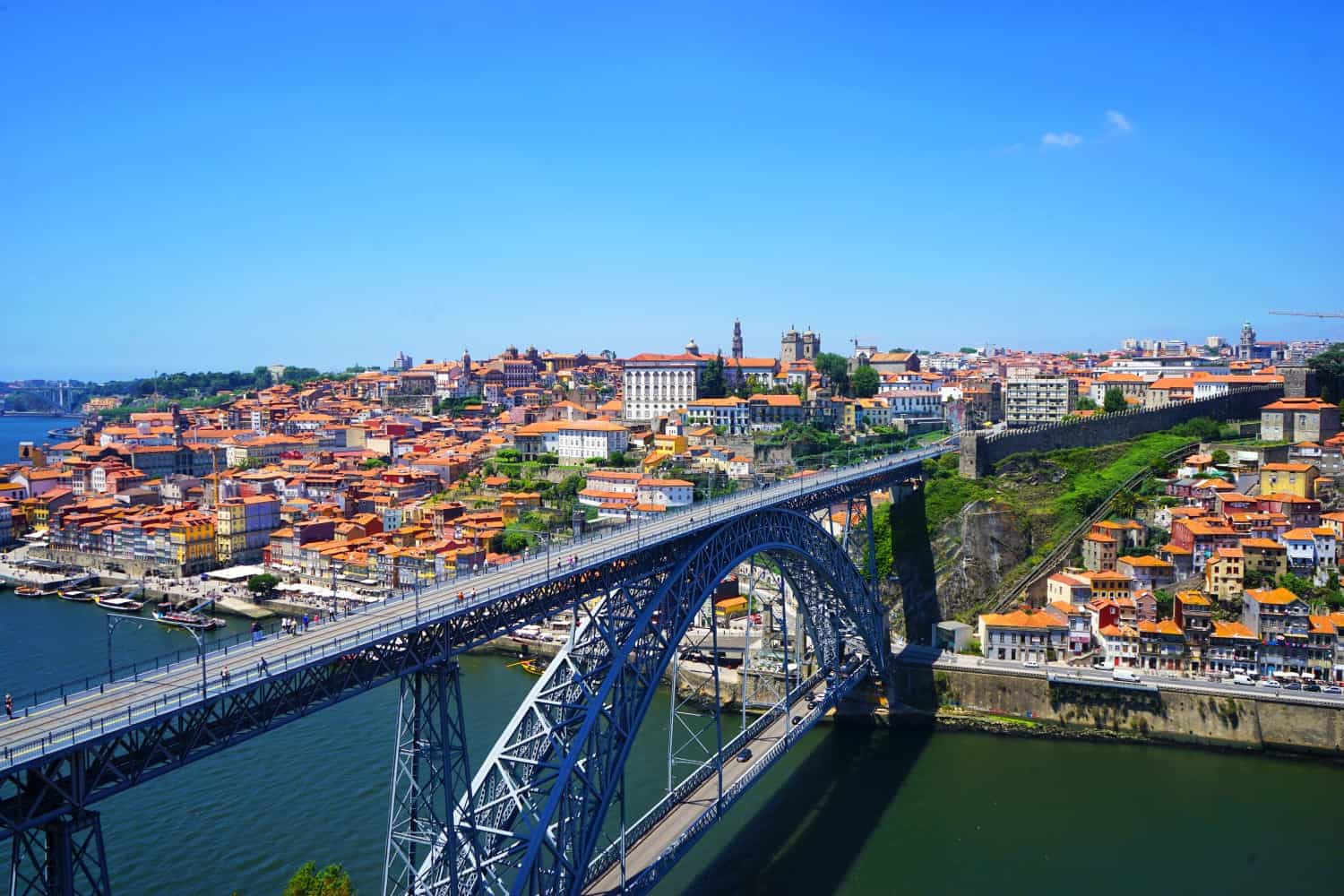
The Cost of Activities and Entrance Fees in Portugal
Portugal has tons to see and do, and plenty of day trips to fill your time with.
One of the best ways to enjoy cities such as Lisbon and Porto is having the day to walk around neighbourhoods aimlessly while window-shopping and stopping for food and drink breaks. On one of my first days in Lisbon, I took a walking tour with Hi Lisbon Walking Tours to get a feel for my surroundings and to learn more about the history. In Porto, I jumped on a tour called The Worst Tour (yes, really), that takes tourists on a tour of Porto’s most interesting abandoned buildings. It was so fun!
A stand-out experience for me was taking a day trip from Lisbon to Sintra (45-minute train ride). Sintra is a charming, medieval town with fairytale castles, mansions, and gardens. It’s one of those places that lives up to the hype when you’re there — I felt like I had stepped right back a few centuries. King Consort Ferdinand II and his wife Queen Maria II of Portugal were the ones that transformed Sintra into a wonderland of European Gothic architecture in the 19th century, and it makes for such a beautiful scene.
Within Lisbon itself, there’s so much to keep you busy: the Lisbon Oceanarium, that’s ranked best in the world, the Lisbon flea market, which had some seriously cool treasures (held every Tuesday and Saturday), the decadent weekend brunch at the Four Seasons that’s a fabulous way to treat yourself, and the Lisbon tile museum, for those of you who can’t get enough of that Portuguese architecture.
Here’s a breakdown of my favourite attractions in Portugal and their respective costs:
- Pena Palace (Sintra): €20
- National Azulejo (tile) Museum (Lisbon): €8
- Lisbon Oceanarium: €25
- Lisbon Castle entrance fee: €15
- Jeronimos Monastery entrance (Belem): €12
- Torre de Belem entrance (Belem): €8
- Santa Justa Lift, in Lisbon: €5.30
- Livraria Lello Bookstore fee (Porto): €8, credited towards a book if you buy one
The Cost of Miscellaneous Expenses in Portugal
eSIM or SIM card: I made the switch to eSIMs a few years ago, and it’s a simple thing that’s greatly improved my travels.
I hated having to spend my first few hours in a country wandering around trying to find a way to get connected. SIM cards are usually expensive at the airport (if they’re even available), but if I didn’t get it there, it was just such a hassle finding somewhere to buy one, dealing with language barriers and registration and scams and… well, it was time-consuming, frustrating, and not how I wanted to start my trip.
These days, I get an eSIM in advance from aloSIM instead. They sell local e-SIMs for travellers, so I just buy one for Portugal or wherever before I get there, and then just turn on my phone and be online before the plane’s even come to a halt. It’s worked flawlessly for me in over a dozen countries so far.
I paid $10 (€9) for 5GB of data for 30 days in Portugal. Readers of Never Ending Footsteps can get a 5% discount on aloSIM eSIMs by using the code FOOTSTEPS.
If you do want a physical SIM card though (maybe your phone is an older one that can’t use eSIMs), Portugal at least isn’t as bad as some countries when it comes to prices or effort. Vodafone has little kiosks in both Lisbon and Porto airports, and tourist SIMs with 10GB of data plus 500 texts or calling minutes costs €20 for 30 days.
Travel insurance: I’m all about ensuring that every single one of my readers understands the importance of travel insurance. When you work in the travel industry, as I do, you’re inundated with news of destitute backpackers on GoFundMe who fell ill while travelling, didn’t have travel insurance, and now can’t afford the hundreds of thousands of dollars needed to be airlifted home for medical care. It happened to an old school friend of mine just last year. In short, if you can’t afford travel insurance, you can’t afford to travel.
Travel insurance will cover you if your flight is cancelled and you need to book a new one, if your luggage gets lost and you need to replace your belongings, if you suddenly get struck down by appendicitis and have to be hospitalised, or discover a family member has died while you’re overseas and need to get home immediately. If you fall seriously ill, your insurance will cover the costs to fly you home to receive medical treatment.
I use SafetyWing as my travel insurance provider, and recommend them for trips to Portugal. They provide worldwide coverage, don’t require you to have a return ticket, and even allow you to buy coverage after you’ve left home. Finally, they have a clear, easy-to-understand pricing structure, which is always appreciated.
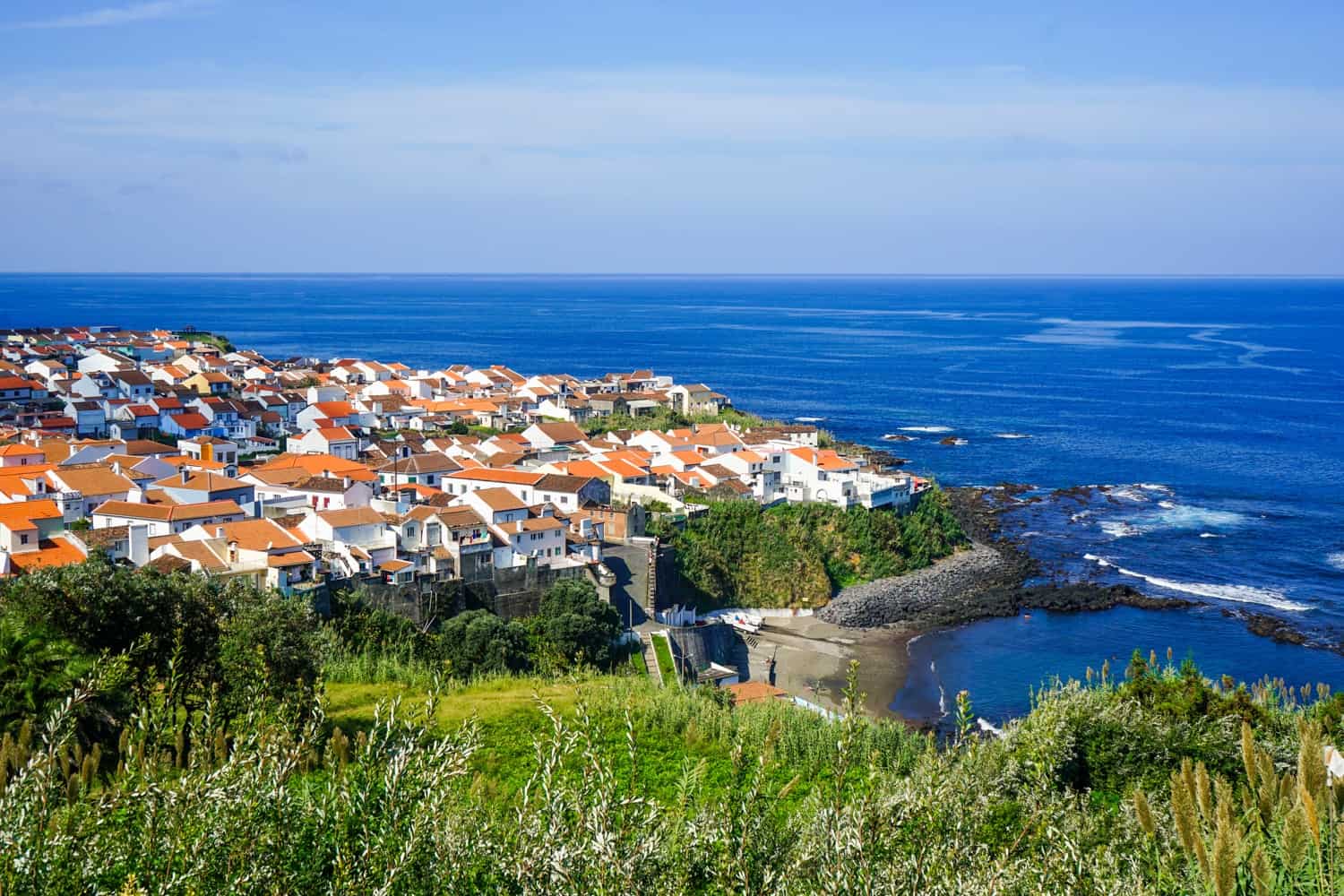
How Much Does it Cost to Travel in Portugal?
It’s time to tally up all of my expenses to see my total travel costs!
- Accommodation: €100 per day
- Transportation: €5 per day
- Food/drink: €40 per day
- Activities/Entrance Fees: €20 per day
- eSIM: €1 per day
Average amount spent in Portugal: €166 a day!
These prices should be about right for most people, but you’ll save quite a bit on accommodation if you’re part of a couple staying in budget or mid-range places, or are happy to stay in dorm rooms in hostels as a solo traveller.
Have you been to Portugal? How much did you spend while you were in town?
Related Articles on Portugal
🇵🇹 After 70 Countries, Why I Moved to Lisbon, Portugal
💚 The Best Things to Do in Lisbon, Portugal
❤️ 28 Best Things to Do in Porto, Portugal
🏝 13 Reasons to Plan a Trip to the Azores
🏚 Exploring the Abandoned Monte Palace Hotel in Sao Miguel







I love these Portugal guides! I can really sense your passion for the country in your writing and it makes me want to go to see why you love it so much. It’s an added bonus that it’s so affordable in comparison to other places in Western Europe!
This is very helpful. Portugal is becoming so popular these days. I hope the prices don’t go up!
You estimated travel cost for one or two persons together?
Awesome article! I, too, love Portugal since I visited with my daughter’s high school trip five years ago. I returned with my wife to Cascais in 2020, then again a few weeks ago (March 2022) to Leiria and Lisbon. Now I’ve spent the last half hour googling Toctoctoc Hotel and Sapientia Hotel in Coimbra, and Evora, dreaming of our next visit! Sure hope I can squeeze in another trip or two before I get much older! Thanks so much for the suggestions!! -Clinton T. from USA
…and Yes, travel costs… taxis, buses, Metro and trains, are very reasonable!
Hi the hotel toctoctoc lisbon is not available on the dates that we are going this december.. is there another hotel you can recommend for us? this is our 1st time to go and want to maybe go live there. any lawyer you can recommend to us in case we love it and need to find information how to go live there since we are US citizens.
I love your website and all the info you provide.
Thank you.
Anywhere in the Principe Real neighbourhood would be a great location — you can search using a map on Booking.
Unfortunately, I don’t have any lawyers to recommend, as I was an EU citizen when I moved to Portugal, so didn’t need a visa. But best of luck with your scouting mission and hope you fall as hard for Lisbon as I did! :-)
Would the average costs per day be a lot different in 2023?
These articles should always be up-to-date whenever you read them — I update prices every 3-6 months to ensure they’re always kept accurate!
Is it difficult to travel in Alentejo without a car? How would you recommend seeing that area?
Actually no! We didn’t have a car in Portugal and were able to get around just fine. We mostly used the train and found it took us to all of the destinations we wanted to see in Alentejo. There are buses, too, which are also easy to use.
Just in the beginning stages of hopefully planning a trip to surprise my daughter when she graduates high school in June. I don’t know if I can afford it and hoped to spend a bunch of time at the beach as I imagine that’s cheaper than shopping 😆 Any great beaches you could recommend? I’d the weather good there in June or should i plan for September instead?